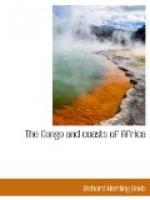VI
OLD CALABAR
While I was up the Congo and the Kasai rivers, Mrs. Davis had remained at Boma, and when I rejoined her, we booked passage home on the Nigeria. We chose the Nigeria, which is an Elder-Dempster freight and passenger steamer, in preference to the fast mail steamer because of the ports of the West Coast we wished to see as many as possible. And, on her six weeks’ voyage to Liverpool, the Nigeria promised to spend as much time at anchor as at sea. On the Coast it is a more serious matter to reserve a cabin than in New York. You do not stop at an uptown office, and on a diagram of the ship’s insides, as though you were playing roulette, point at a number. Instead, as you are to occupy your cabin, not for one, but for six, weeks, you search, as vigilantly as a navy officer looking for contraband, the ship herself and each cabin.
But going aboard was a simple ceremony. The Hotel Splendide stands on the bank of the Congo River. After saying “Good-by” to her proprietor, I walked to the edge of the water and waved my helmet. In the Congo, a white man standing in the sun without a hat is a spectacle sufficiently thrilling to excite the attention of all, and at once Captain Hughes of the Nigeria sent a cargo boat to the rescue, and on the shoulders of naked Kroo boys Mrs. Davis and the maid, and the trunks, spears, tents, bathtubs, carved idols, native mats, and a live mongoos were dropped into it, and we were paddled to the gangway.
“If that’s all, we might as well get under way,” said Captain Hughes. The anchor chains creaked, from the bank the proprietor of the Splendide waved his hand, and the long voyage to Liverpool had begun. It was as casual as halting and starting a cable-car.
According to schedule, after leaving the Congo, we should have gone south and touched at Loanda. But on this voyage, outward bound, the Nigeria had carried, to help build the railroad at Lobito Bay, a deckload of camels. They had proved trying passengers, and instead of first touching at the Congo, Captain Hughes had continued on south and put them ashore. So we were robbed of seeing both Loanda and the camels.
This line, until Calabar is reached, carries but few passengers, and, except to receive cargo, the ship is not fully in commission. During this first week she is painted, and holystoned, her carpets are beaten, her cabins scrubbed and aired, and the passengers mess with the officers. So, of the ship’s life, we acquired an intimate knowledge, her interests became our own, and the necessity of feeding her gaping holds with cargo was personal and acute. On a transatlantic steamer, when once the hatches are down, the captain need think only of navigation; on these coasters, the hatches never are down, and the captain, that sort of captain dear to the heart of the owners, is the man who fills the holds.




